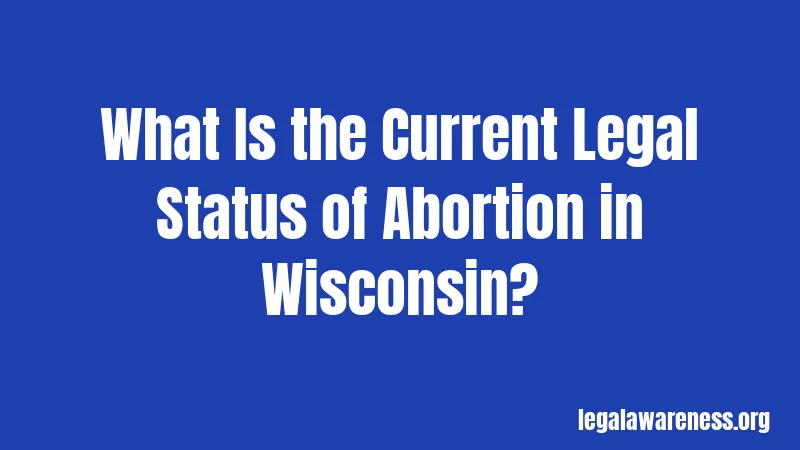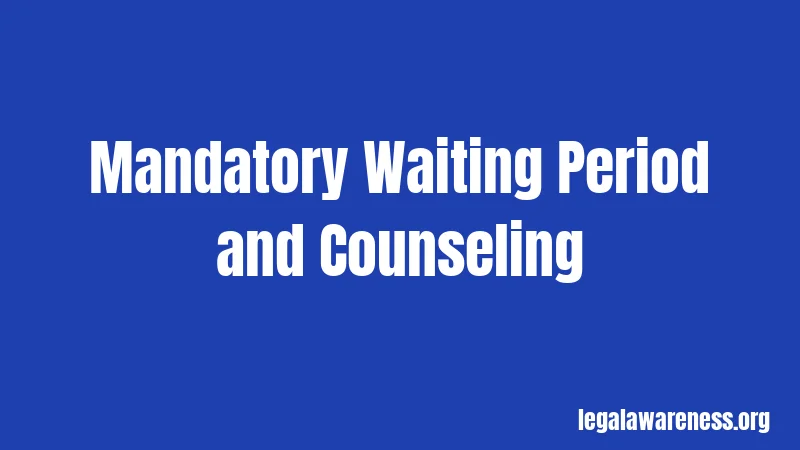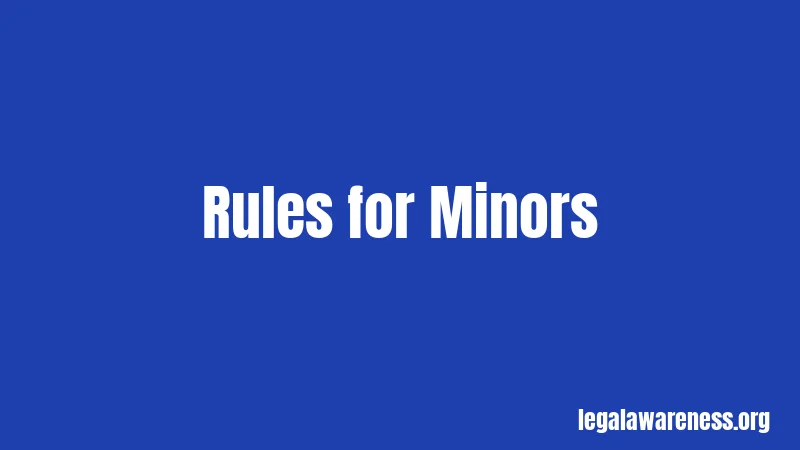Abortion Laws in Wisconsin (2026): After the Big Court Ruling
Most people have no idea how much Wisconsin’s abortion laws changed in 2025. Seriously. After years of confusion following the end of Roe v. Wade, the Wisconsin Supreme Court finally cleared things up. But here’s the thing—there are still a lot of rules you need to know about.
Let’s break down exactly what’s legal, what’s not, and what you need to do if you’re seeking abortion care in Wisconsin.
What Is the Current Legal Status of Abortion in Wisconsin?

Abortion is legal in Wisconsin. That’s the short answer.
But getting there was a wild ride. When the U.S. Supreme Court overturned Roe v. Wade in June 2022, everyone panicked. Wisconsin had an 1849 law on the books that banned almost all abortions. Providers stopped offering services immediately.
For over a year, abortion care basically disappeared in the state. Then courts started weighing in. A lower court ruled in late 2023 that the old law didn’t actually ban consensual abortions. Services resumed. And in July 2025, the Wisconsin Supreme Court made it official—the 1849 law was struck down for good.
Now Wisconsin follows a 20-week limit based on laws passed in more recent decades. Pretty straightforward, right?
The 20-Week Abortion Ban
Here’s where things get specific. Wisconsin law prohibits abortion at 20 weeks post-fertilization and later. This is roughly 22 weeks from your last menstrual period.
Wondering what that means in practice? Most abortions happen well before this cutoff. The law does include exceptions, though.
You can get an abortion after 20 weeks if:
The abortion is necessary to preserve your life or health. A doctor must determine this based on reasonable medical judgment. In cases of medical emergencies, the rules are more flexible.
One important thing—these later abortions after viability must be performed in a hospital on an inpatient basis. That’s state law.
Mandatory Waiting Period and Counseling

Okay, pause. This part is important.
Wisconsin requires a 24-hour waiting period before you can have an abortion. You can’t just walk into a clinic and get care that day. The law forces patients to make two separate trips.
Here’s how it works. First, you meet with a physician for in-person counseling. The doctor must provide specific state-required information. Then you wait at least 24 full hours. Only after that waiting period can you return for the actual procedure.
Sound complicated? It is. Many people find this requirement difficult, especially if they live far from a clinic or have work and childcare obligations.
There are some exceptions. In cases of sexual assault or incest, the waiting period requirements may be reduced. For sexual assault cases, the 24-hour wait can be waived entirely. For incest cases, the waiting period may be shortened but must be at least two hours.
Mandatory Ultrasound Requirement
You’re also required to get an ultrasound before having an abortion in Wisconsin. The physician must perform the ultrasound and provide an oral explanation of what the images show at the same time.
Here’s what many people don’t realize—you don’t have to look at the ultrasound. You can choose to turn away. But the law still requires the provider to offer you the chance to view it.
This requirement applies even when an ultrasound isn’t medically necessary. Many health experts consider this an unnecessary barrier to care.
Rules for Minors

Not sure what the rules are for teens? Let me break it down.
If you’re under 18 and not married or legally independent, Wisconsin law requires you to get written consent from an adult before having an abortion. This isn’t just notification—it’s actual consent.
Who can give consent:
Someone from this list must provide written approval: one of your parents, a legal guardian, a grandparent, an aunt, uncle, or sibling who is at least 25 years old, or a foster parent (if certain conditions are met).
What if that’s not possible?
Here’s the good news. There’s a judicial bypass option. You can petition a court to waive the consent requirement. A judge can approve your abortion if they find either of the following: you’re mature enough to make this decision yourself, or the abortion is in your best interests.
The court must decide within 3 calendar days of your first appearance. It’s meant to be a quick process.
In cases where a parent or guardian has inflicted abuse, you can provide a written statement explaining this. The provider must then report the abuse as required by law.
Medication Abortion Rules
This one’s tricky, honestly.
Wisconsin has very strict rules about medication abortion, also called “the abortion pill.” The law requires that a physician be physically present in the same room when you take the medication. That means telehealth abortion isn’t allowed in Wisconsin.
You cannot get abortion pills mailed to you from a Wisconsin provider. You must go to a clinic in person.
The abortion pill can typically be used up to about 10-11 weeks of pregnancy at Wisconsin clinics. Some people choose to travel to neighboring states like Illinois or Minnesota, where telehealth abortion is permitted.
Who Can Provide Abortions?
Only physicians can perform abortions in Wisconsin. Nurse practitioners, physician assistants, and other qualified healthcare professionals cannot provide abortion care under current state law.
This is different from many other states that allow various types of medical professionals to offer early abortion care.
Penalties for Illegal Abortions
Let’s talk about the penalties. This is the part most people miss.
If someone performs an abortion after viability (or after 20 weeks post-fertilization) without meeting the legal exceptions, they’re committing a Class I felony. A non-physician who performs any abortion is also guilty of a Class I felony.
What does that mean?
A Class I felony in Wisconsin carries up to 3.5 years in prison and fines up to $10,000. It’s the lowest level of felony in the state—but it’s still a felony. That means a permanent criminal record, loss of voting rights during the sentence, and a lifetime ban on possessing firearms.
Here’s something crucial though—the pregnant person seeking the abortion is NOT criminally liable. Wisconsin law specifically exempts the woman from prosecution. The penalties apply to providers who break the rules, not patients.
Insurance and Funding Restrictions
Wisconsin limits how abortions can be paid for. State Medicaid generally does not cover abortion except in very limited circumstances, such as when the pregnancy results from rape or incest, or when the woman’s life is in danger.
Private insurance coverage is also restricted under Wisconsin law. Many insurance plans in the state don’t cover elective abortions.
Financial assistance may be available through abortion funds. Organizations like the Wisconsin Abortion Fund help people cover costs for appointments and procedures.
Where Can You Get an Abortion in Wisconsin?
This might surprise you. There are only a handful of abortion clinics in the entire state.
Planned Parenthood of Wisconsin operates three locations offering abortion services: in Madison, Milwaukee, and Sheboygan. The Sheboygan clinic provides only medication abortion, while Madison and Milwaukee offer both medication and surgical options.
Additionally, Affiliated Medical Services and Care for All operate independent clinics in Milwaukee.
That’s it. Most Wisconsin counties—71 out of 72—have no in-person abortion provider. If you don’t live near Madison, Milwaukee, or Sheboygan, you may need to travel significant distances to get care.
Services are available through about 21-22 weeks of pregnancy, depending on the clinic.
Recent Changes and Developments
The biggest change came in July 2025. The Wisconsin Supreme Court ruled 4-3 that the 1849 abortion ban had been implicitly repealed by newer laws passed over the last 50 years.
The court’s majority found that the state legislature had passed so many laws regulating abortion—covering the “who, what, where, when, and how”—that the old law was no longer in effect.
In late 2025, there was a brief pause in services at Planned Parenthood locations due to federal Medicaid funding changes. Services resumed in late October 2025 after the organization adjusted its funding status.
The question of whether Wisconsin’s state constitution protects abortion rights remains unanswered. The Supreme Court dismissed a case that raised this question because of how they ruled on the 1849 law. Future court cases or legislative action could still change the landscape.
What Happens in Neighboring States?
Knowing your neighbors’ laws matters.
Illinois has no waiting period, no mandatory ultrasound, and permits telehealth abortion. Minors don’t need parental consent. It’s one of the most accessible states for abortion care in the Midwest.
Minnesota also protects abortion rights with fewer restrictions than Wisconsin. Telehealth abortion is available.
Michigan protects abortion access as well, though some restrictions apply.
Iowa, on the other hand, has a fetal heartbeat law banning most abortions around six weeks of pregnancy—often before many people know they’re pregnant.
Many Wisconsin residents travel to Illinois or Minnesota for care, especially those seeking medication abortion by mail.
How to Get an Abortion in Wisconsin
Ready to understand the process? Here’s the deal.
Step 1: Schedule your first appointment for counseling with a physician. This must be done in person at a clinic.
Step 2: Receive the state-mandated information and have an ultrasound performed.
Step 3: Wait at least 24 hours.
Step 4: Return to the clinic for your abortion procedure.
If you’re under 18, you’ll need adult consent or a judicial bypass before the procedure can happen.
Bring a valid ID and payment or financial assistance documentation. Some clinics require the 24-hour counseling visit to be paid for separately from the procedure.
Frequently Asked Questions
Is abortion legal in Wisconsin? Yes. Abortion is legal until 20 weeks post-fertilization, with exceptions after that point for life or health emergencies.
Do I need parental consent if I’m a minor? Yes. Minors need written consent from a parent, guardian, or qualifying adult family member. A judicial bypass is available if that’s not possible.
Can I get abortion pills by mail in Wisconsin? No. State law requires a physician to be physically present when you take medication abortion. Telehealth abortion is banned.
How much does an abortion cost in Wisconsin? Costs vary by how far along the pregnancy is and the type of procedure. Medication abortion typically costs $400-800. Surgical procedures may cost more. Financial assistance may be available through abortion funds.
Will I face criminal penalties for getting an abortion? No. Wisconsin law exempts the pregnant person from any criminal liability. Only providers can face penalties for violating abortion laws.
Final Thoughts
Wisconsin’s abortion laws have stabilized after years of uncertainty. The 2025 Supreme Court ruling brought clarity, but plenty of restrictions remain in place. The 24-hour waiting period, mandatory ultrasound, and limits on who can provide care all create hurdles.
If you’re seeking abortion care in Wisconsin, plan ahead. Call clinics early, understand the two-visit requirement, and explore financial assistance if needed. And if Wisconsin’s rules feel too restrictive, remember that neighboring states may offer more accessible options.
Stay informed. Know your rights. And when in doubt, talk to a healthcare provider or legal resource for guidance specific to your situation.
References
- Wisconsin Legislative Council Issue Brief: Overview of Abortion Laws (April 2024): https://docs.legis.wisconsin.gov/misc/lc/issue_briefs/2024/health/ib_overview_of_abortion_laws_msk_2024_04_15
- Wisconsin Supreme Court Decision – Kaul v. Urmanski (July 2025): https://www.wicourts.gov/sc/opinion/DisplayDocument.pdf?content=pdf&seqNo=979066
- Wisconsin Statutes Section 940.15 – Abortion: https://docs.legis.wisconsin.gov/document/statutes/940.15
- Wisconsin Statutes Section 48.375 – Parental Consent: https://docs.legis.wisconsin.gov/document/statutes/48.375
- Center for Reproductive Rights – Wisconsin: https://reproductiverights.org/maps/abortion-laws-by-state/wisconsin/
- Guttmacher Institute – Wisconsin Abortion Policies: https://states.guttmacher.org/policies/wisconsin/abortion-policies
- Planned Parenthood of Wisconsin – Abortion Resources: https://www.plannedparenthood.org/planned-parenthood-wisconsin/patients/abortion-resources-wisconsin
